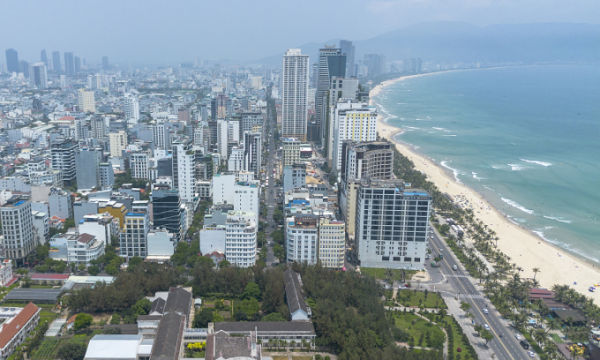
The first half of 2025 saw a number of notable foreign-led transactions. These include CapitaLand’s US$553 million acquisition of a project from Becamex IDC; the partnership of Sumitomo Forestry, Kumagai Gumi and NTT Urban Development with Kim Oanh Group to develop The One World project; and Nishi Nippon Railroad’s purchase of a 25% stake in Nam Long’s Paragon Dai Phuoc project.
|
Buildings in Da Nang City in April 2025. Photo by VnExpress/Nguyen Dong |
According to Grant Thornton Vietnam, property M&A has staged a strong recovery after a quiet period, buoyed by favourable macroeconomic conditions that have strengthened market demand. The Land Law, which came into force in August 2024, has also improved transparency and created fresh impetus for growth.
Nguyen Le Dung, Head of Investment Consulting at Savills Hanoi, noted that Vietnam is seen by many multinational corporations as a strategic destination amid growing global polarisation, thanks to its neutral stance, political stability, and comprehensive partnerships with the U.S., China, Japan and the EU.
Foreign investors are showing greater preference for projects with clear legality, willing to pay more for transparency and faster cash flow realisation. Investment funds, particularly from Europe and North America, are making Environmental, Social and Governance (ESG) standards a prerequisite for participation.
Looking ahead, the Vietnamese real estate market is forecast to enjoy positive momentum, with investment deals expected to rise significantly. “Friendly” M&A will likely remain the dominant approach, focusing on shared interests and long-term cooperation, Dung added.
However, persistent challenges continue to weigh on the market. Vu Thi Que, Founding Partner and Chairwoman of Rajah & Tann LCT Lawyers, highlighted overlapping and inconsistent legal provisions as the main obstacle for foreign investors. Land- regulations are spread across several laws, including the Investment Law, Land Law and Housing Law, creating complexity.
This often requires foreign investors to spend considerable time navigating the legal framework. Once in the market, they rarely undertake projects alone, instead opting to collaborate with local partners. Such arrangements bring contractual obligations, but dispute resolution remains insufficiently transparent, which undermines investor confidence. Land disputes, in particular, must be taken to court, whereas many investors favour more flexible mechanisms, Que said.
Que advised Vietnamese businesses to make a clear assessment of their development stage before seeking foreign capital. Those in need of funding should prioritise strategic investors, who not only provide financial resources but can also contribute technical expertise, business experience, and international branding to enhance credibility, profitability and sales.